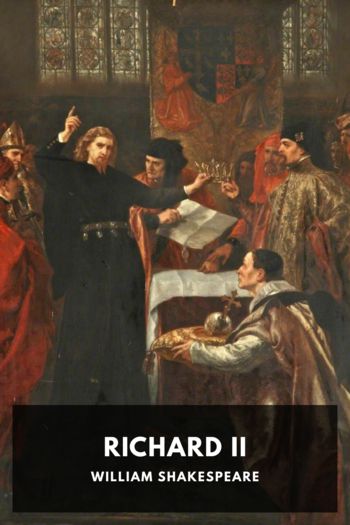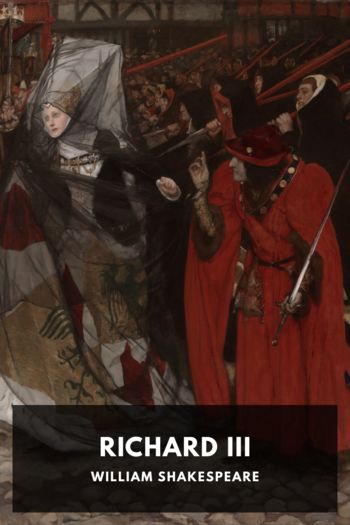Richard II William Shakespeare (best self help books to read TXT) 📖

- Author: William Shakespeare
Book online «Richard II William Shakespeare (best self help books to read TXT) 📖». Author William Shakespeare
Four lagging winters and four wanton springs
End in a word: such is the breath of kings. Gaunt
I thank my liege, that in regard of me
He shortens four years of my son’s exile:
But little vantage shall I reap thereby;
For, ere the six years that he hath to spend
Can change their moons and bring their times about,
My oil-dried lamp and time-bewasted light
Shall be extinct with age and endless night;
My inch of taper will be burnt and done,
And blindfold death not let me see my son.
But not a minute, king, that thou canst give:
Shorten my days thou canst with sullen sorrow,
And pluck nights from me, but not lend a morrow;
Thou canst help time to furrow me with age,
But stop no wrinkle in his pilgrimage;
Thy word is current with him for my death,
But dead, thy kingdom cannot buy my breath.
Thy son is banish’d upon good advice,
Whereto thy tongue a party-verdict gave:
Why at our justice seem’st thou then to lour?
Things sweet to taste prove in digestion sour.
You urged me as a judge; but I had rather
You would have bid me argue like a father.
O, had it been a stranger, not my child,
To smooth his fault I should have been more mild:
A partial slander sought I to avoid,
And in the sentence my own life destroy’d.
Alas, I look’d when some of you should say,
I was too strict to make mine own away;
But you gave leave to my unwilling tongue
Against my will to do myself this wrong.
Cousin, farewell; and, uncle, bid him so:
Six years we banish him, and he shall go. Flourish. Exeunt King Richard and train.
Cousin, farewell: what presence must not know,
From where you do remain let paper show.
My lord, no leave take I; for I will ride,
As far as land will let me, by your side.
O, to what purpose dost thou hoard thy words,
That thou return’st no greeting to thy friends?
I have too few to take my leave of you,
When the tongue’s office should be prodigal
To breathe the abundant dolour of the heart.
My heart will sigh when I miscall it so,
Which finds it an inforced pilgrimage.
The sullen passage of thy weary steps
Esteem as foil wherein thou art to set
The precious jewel of thy home return.
Nay, rather, every tedious stride I make
Will but remember me what a deal of world
I wander from the jewels that I love.
Must I not serve a long apprenticehood
To foreign passages, and in the end,
Having my freedom, boast of nothing else
But that I was a journeyman to grief?
All places that the eye of heaven visits
Are to a wise man ports and happy havens.
Teach thy necessity to reason thus;
There is no virtue like necessity.
Think not the king did banish thee,
But thou the king. Woe doth the heavier sit,
Where it perceives it is but faintly borne.
Go, say I sent thee forth to purchase honour
And not the king exiled thee; or suppose
Devouring pestilence hangs in our air
And thou art flying to a fresher clime:
Look, what thy soul holds dear, imagine it
To lie that way thou go’st, not whence thou comest:
Suppose the singing birds musicians,
The grass whereon thou tread’st the presence strew’d,
The flowers fair ladies, and thy steps no more
Than a delightful measure or a dance;
For gnarling sorrow hath less power to bite
The man that mocks at it and sets it light.
O, who can hold a fire in his hand
By thinking on the frosty Caucasus?
Or cloy the hungry edge of appetite
By bare imagination of a feast?
Or wallow naked in December snow
By thinking on fantastic summer’s heat?
O, no! the apprehension of the good
Gives but the greater feeling to the worse:
Fell sorrow’s tooth doth never rankle more
Than when he bites, but lanceth not the sore.
Come, come, my son, I’ll bring thee on thy way:
Had I thy youth and cause, I would not stay.
Then, England’s ground, farewell; sweet soil, adieu;
My mother, and my nurse, that bears me yet!
Where’er I wander, boast of this I can,
Though banish’d, yet a trueborn Englishman. Exeunt.
The court.
Enter the King, with Bagot and Green at one door; and the Duke of Aumerle at another. King RichardWe did observe. Cousin Aumerle,
How far brought you high Hereford on his way?
I brought high Hereford, if you call him so,
But to the next highway, and there I left him.
Faith, none for me; except the north-east wind,
Which then blew bitterly against our faces,
Awaked the sleeping rheum, and so by chance
Did grace our hollow parting with a tear.
“Farewell:”
And, for my heart disdained that my tongue
Should so profane the word, that taught me craft
To counterfeit oppression of such grief
That words seem’d buried in my sorrow’s grave.
Marry, would the word “farewell” have lengthen’d hours
And added years to his short banishment,
He should have had a volume of farewells;
But since it would not, he had none of me.
He is our cousin, cousin; but ’tis doubt,
When time shall call him home from banishment,
Whether our kinsman come to see his friends.
Ourself and Bushy, Bagot here and Green
Observed his courtship to the common people;
How he did seem to dive into their hearts
With humble and familiar courtesy,
What reverence he did throw away on slaves,
Wooing poor craftsmen with the craft of smiles
And patient underbearing of his fortune,
As ’twere to banish their affects with him.
Off goes his bonnet to an oyster-wench;
A brace of draymen bid God speed him well
And had the tribute of his supple knee,
With “Thanks, my countrymen, my loving





Comments (0)